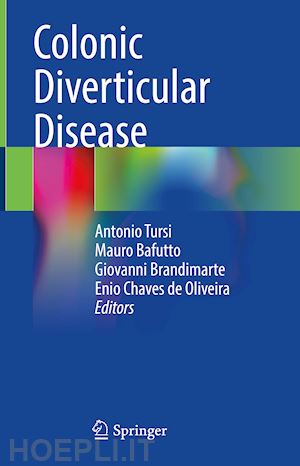

Questo prodotto usufruisce delle SPEDIZIONI GRATIS
selezionando l'opzione Corriere Veloce in fase di ordine.
Pagabile anche con Carta della cultura giovani e del merito, 18App Bonus Cultura e Carta del Docente
The book provides up-to-date information on all aspects of colonic diverticular disease, particularly common in Western countries. Most people suffering from it remain asymptomatic, while about 20% develop symptoms without complications, experiencing the so-called "Symptomatic Non-Complicated Diverticular Disease" (SUDD). 10-25% of this last group eventually develop diverticulitis, with or without complications. The incidence of diverticulitis and diverticular colon disease is increasing worldwide, and is becoming a significant burden for national health systems in terms of direct and indirect costs, also because its prevalence increases with age. Unfortunately, the disease pathogenesis is relatively unknown and several aetiological factors may play a role in its onset.
The first parts of the book will deal with the disease epidemiology and etiopathogenesis, focusing on the roles of inflammation and dysbiosis as part of the pathophysiology of diverticular disease. The clinical spectrum, the diagnostic approach and differential diagnosis, medical and surgical treatments are described in the following sections.Written by experts in the field, the volume will be a unique and valuable resource for all clinicians, residents, and physicians involved in the management of this disease.
Part 1 Epidemiology: 1- history of the disease.- 2 -anatomy of the colon and colonic diverticula.- 3- epidemiology of diverticular disease.- 4 -economic burden of diverticular disease.- 5 colorectal cancer and diverticular disease.- 6 myth and evidence.- - Part 2: Etiopatogenesis: 7- motility in diverticular disease.- 8- enteric nervous system and diverticular disease.- 9 - hypersensibility, visceral perception.- 10- role of mucosal inflammation.- 11- molecular basis of diverticular disease.- 12 - the colonic fibrosis.- 13 - genetic aspects.- 14 -the microbiome and diverticular disease.- 15 - obesity and diverticular disease.- 16- lifestyles and diverticular disease.- Part 3 - Clinical spectrum of diverticular disease: 17 - symptomatic uncomplicated diverticular disease (SUDD).- 18 - uncomplicated diverticulitis.- 19 - complicated diverticulitis.- 20 – bleeding.- 21 - segmental colitis associated diverticular disease (SCAD).- 22 - diverticular disease in the immunocompromised patient.- Part 4: Diagnostic approach: 23- investigation of patient with suspect diverticular disease.- 24- laboratory in diverticular disease.- 25- imaging of diverticular disease.- 26- colonoscopy in diverticular disease.- 27- DICA classification.- 28- complicated forms of diverticular disease.- 29- differential diagnosis in diverticular disease.- 30- pathology of diverticular disease.- Part 5: Differential diagnosis: 31- irritable bowel syndrome vs SUDD.- 32- SIBO and diverticular disease.- 33- segmental colitis associated to diverticulosis vs IBD.- Part 6: Medical treatment: 34- prevention of diverticular disease.- 35- nutritional approach to diverticular disease.- 36- fibers.- 37- probiotics.- 38- aminosalicylates 39- antibiotics.- 40- medical treatment of acute diverticulitis.- 41- treatment of recurrent diverticulitis.- 42- treatment of non-complicated diverticular disease.- 43- evidence-based medical treatment in preventing acute diverticulitis recurrence.- - Part 7 Endoscopic and surgical treatment: 44 - current management of diverticular bleeding.- 45- surgical treatment of acute diverticulitis.- 46- evidence based surgical treatment of diverticular disease.- 47- laparoscopic surgery for Hinchey III and IV acute diverticulitis.- 48- open surgery for Hinchey III and IV acute diverticulitis.- 49-robotic surgery for diverticular disease.- 50 - colostomy in diverticular disease.- 51 - symptoms recurrence and management after surgery.
Mauro Bafutto, MD PhD, is currently an Associate Professor of Gastroenterology, School of Medicine, Universidade Federal de Goiás, Goiânia, Brazil. His main research interests are: diverticular disease of the colon; inflammatory bowel disease; inflammation. He has published 50 articles in peer reviewed journals and 35 book chapters. He has presented 180 lectures at national and international congresses.
Enio Chaves Oliveira, MD PhD, Chief of the Digestive System Division, Hospital da Clinicas, Universidade Federal de Goiás, Goiânia, Brazil, is Associate Professor of Surgery, School of Medicine, Universidade Federal de Goiás, Goiânia, Brazil, and Professor at the Post-Graduated Health Science Programme at the same university. His research interests focus on diverticular disease of the colon, enteric nervous system, and inflammation. He authored 80 peer-reviewed articles and 25 book chapters. He has delivered more than 150 lectures in national and international congresses.
Antonio Tursi, MD is Chief of the Territorial Gastroenterology Service, Local Sanitary Agency Barletta-Andria-Trani, Andria, Italy and an Associate Professor of Territorial Gastroenterology at the Post-Graduate School of Gastroenterology, Catholic University, Rome, Italy. His main research interests include: diverticular disease of the colon; inflammatory bowel diseases; celiac disease. He has published over 300 articles in peer-reviewed journals (H-index 40) and 14 book chapters. He has presented more than 200 lectures in national and international congresses. Giovanni Brandimarte, MD is Chief of the Department of Internal Medicine and, Gastroenterology, “Cristo Re” Hospital, Rome, Italy. He is an Associate Professor of Psychosomatic Gastroenterology at the Post-Graduate School of Psychosomatic, College Consorsio Humanitas, Rome, Italy. His main research interests focus on: diverticular disease of the colon; celiac disease. He contributed to the fieldwith more than 155 articles in peer-reviewed journals, and 125 lectures in national and international congresses.










Il sito utilizza cookie ed altri strumenti di tracciamento che raccolgono informazioni dal dispositivo dell’utente. Oltre ai cookie tecnici ed analitici aggregati, strettamente necessari per il funzionamento di questo sito web, previo consenso dell’utente possono essere installati cookie di profilazione e marketing e cookie dei social media. Cliccando su “Accetto tutti i cookie” saranno attivate tutte le categorie di cookie. Per accettare solo deterninate categorie di cookie, cliccare invece su “Impostazioni cookie”. Chiudendo il banner o continuando a navigare saranno installati solo cookie tecnici. Per maggiori dettagli, consultare la Cookie Policy.